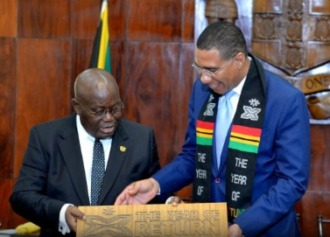
The 43-year-old father of two was deported in May 2012 from the U.S. to his Caribbean homeland because he was convicted of a marijuana-related felony drug charge in 1997 — despite the four years he served in the Navy, including a few months on a supply ship during the first Gulf War.
Weighed down by worry and bone-deep weariness, he wants to get back to his family and the future he thought he was building in Virginia. Bailey was a teenager when he and his siblings followed their mother to New York City as green-card holders (legal permanent residents), and he long considered the United States his home.
“It’s so hard,” Bailey said, gesturing at a few rough-hewn pigpens and yam vines climbing up bamboo sticks. “I went from owning a successful trucking business and two homes in the U.S., paying my taxes, raising two beautiful children with a beautiful wife to, well, what you see here.”
Bailey’s case has drawn the attention of immigration lawyers and media because his crime seems relatively minor and the punishment extreme. But he’s not unique: Thousands of non-citizens who served in the U.S. military have been deported to countries around the globe in recent years, immigrant advocates estimate. The precise number is unknown because the U.S. government does not track deportees by veteran status.
Some say the deportees deserve special consideration because of their military service. “We treated you as a national when you wore the uniform, we should treat you as one when it comes off,” said Pennsylvania immigration attorney Craig Shagin, who assists a group for deportees called Banished Veterans.
If legal permanent residents die while serving in the U.S. military, they are granted a military funeral and citizenship. But if they finish their service without becoming nationalized and are later arrested, as Bailey was, they are subject to immigration laws passed in 1994 and 1996 that expanded the list of deportable offenses.
Read the full story at jamaicaobserver.com


